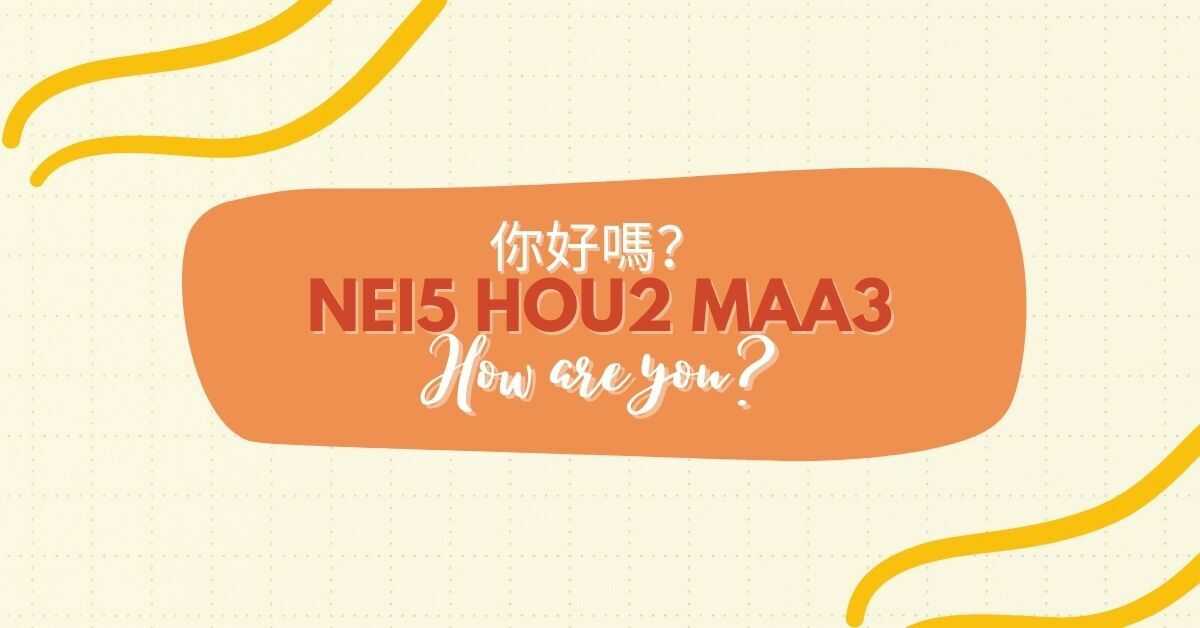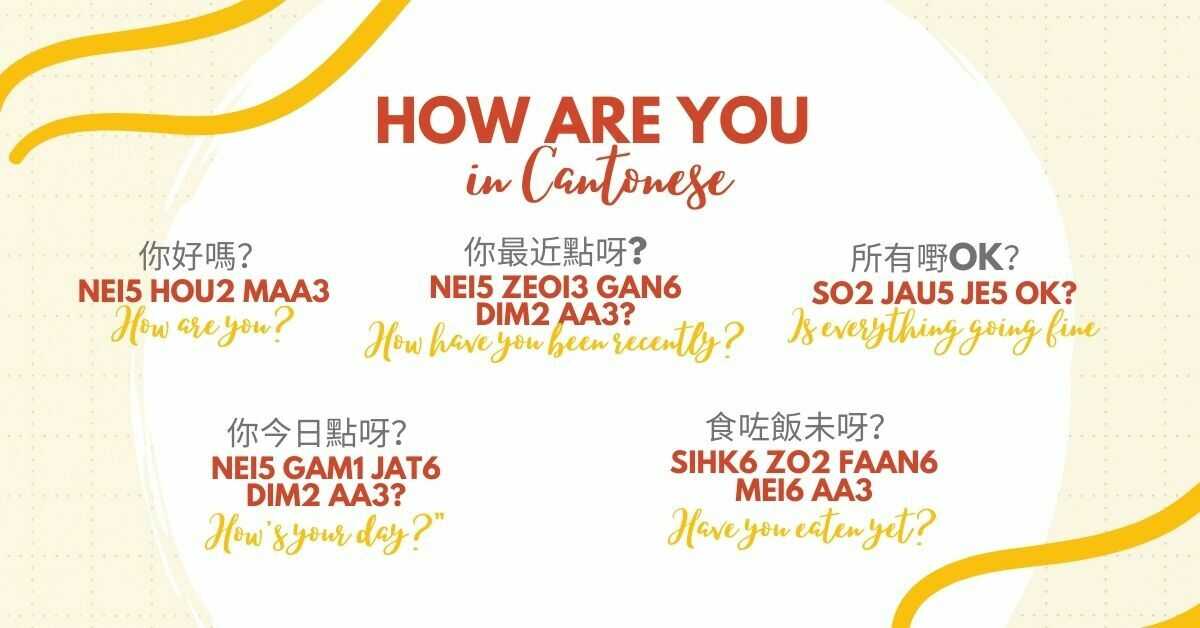How are you in Cantonese (你好嗎/ néi5 hóu2 maa3) is a question typically asked people whenever you meet them. Asking a person ( 人/ jan4) this question may have different meanings and purposes. It can be another way of saying hello (你好/ néih hóu ) to someone. It can also be a good conversation starter and ice breaker and most of all, it can also be a way of letting someone know that you care for him/her. With everything that is happening around the world nowadays, a simple “How are you?” can save lives.

If you will visit Chinese countries like Hong Kong and China, you might be hearing a lot of this word but most probably, in different tones and written form. The reason behind this is the difference between Mandarin and Cantonese. If you are planning to visit Hong Kong, then you should learn how to say how are you? in Cantonese which is 你好嗎/ néih hóu maa? But if you want to visit mainland China, then 你好 / nǐ hǎo ma is the Mandarin term for how are you? It may sound really similar but people who speak Cantonese and Mandarin will probably know the differences.
How Are You In Cantonese
It is nice to hear the question “How are you?” from the people you value. Learning how to say how are you In Cantonese will be really helpful if you want to visit Hong Kong or you just want to learn Cantonese. This is one of the easiest but also one of the most essential words to learn as a beginner. To begin with, here are words and phrases that native Cantonese speakers use when asking someone how are you in Cantonese:

1. 你好嗎?(néih hóu maa/ nei5 hou2 maa3)
As a beginner, you need to learn the basic and formal way to say ‘how are you?’ in Cantonese. 你好嗎 is pronounced as nei5 hou2 maa3 and it literally means “How are you?” in English. This can be used when asking people about their well-being or greeting someone hello.
2. 你最近點呀? (neih zeoi gan dim aa?/nei5 zeoi3 gan6 dim2 aa3? )
Another way of asking someone how are you in Cantonese is 你最近點呀? – pronounced as nei5 zeoi3 gan6 dim2 aa3?. The English translation of this phrase is “How have you been recently?”. Asking someone what is his/her current situation will somehow give them a warm feeling because they know that somebody cared for them.
3. 所有嘢OK?(so jau je OK? /so2 jau5 je5 OK?)
The English translation of this expression is “Is everything going fine?”. This is also a nice way to ask about other people’s current situation. This may also land into other topics and they will be able to share something about their current life situation like recent accomplishments and even problems.
4. 你今日點呀?(nei gam jat dim aa?/ nei5 gam1 jat6 dim2 aa3?)
Unlike the previous one, this is more casual because it only covers a whole day. This Cantonese expression means “How’s your day?” in English. Many people do not realize the value of asking a person about their day. This is typically asked by parents to their children or spouses to their husband/wife after a long tiring day. We don’t know what a person is dealing with so make it a habit to ask this question to the people around you.
5. 食咗飯未呀?(sihk zo faan mei aa? / sihk6 zo2 faan6 mei6 aa3)
Food and eating well is very important in Chinese culture that is why asking someone 食咗飯未呀 sihk6 zo2 faan6 mei6 aa3? have been a popular greeting among Chinese. This expression means “Have you eaten yet?” in English. Asking someone if they have already eaten is also a way of showing concern to someone. If he/she answered “not yet” (仲未 / zung6 mei6), then it wouldn’t hurt to invite him/her for a nice lunch or dinner. Anyway, Cantonese food is really delicious to eat, so why not?
Just as how a simple Good morning can brighten your day, asking someone “How are you?” can also do the same. There are a lot of ways to ask people how they are. Whatever your purpose is, it is definitely a sign of politeness and care for others. One of the good things about asking how are you is that you can use this to people even if you do not personally know them.

Now that you already know five ways of asking how are you in Cantonese, try to practice it on your own. Please remember that in the Chinese language, the sounds of each character are really important in the spoken language so try your best to learn the correct pronunciation. The romanization is already given to you, anyway. Please remember that practice is key in mastering a certain language.
How To Respond To How Are You

When someone is talking to you, it is a must to answer back. There is nothing wrong with answering using English but speaking the Cantonese language to talk to the local Hong Kongers could definitely warm their hearts. Here is the common response to how are you in Cantonese:
1. 我好好。(ngo5 hou2 hou2 )
Meaning: I’m fine. / I’m great
This is the common way of responding to how are you?. It is used in both formal and informal conversations. You can also add “Thank you” (多謝。do1 ze6) at the end as a sign of politeness.
2. 我OK啦。(ngo5 OK laa1.)
Meaning: I’m okay.
This is also the same as the first one but those who speak English will find this easier since it uses the English word “Ok”.
3. 我幾好。 (ngo5 gei2 hou2.)
Meaning: I’m not bad.
There are times when you feel not so bad, but not so okay also. This is the perfect response to use.
4. 我情緒好差。(ngo5 cing4 seoi5 hou2 caa1.)
Meaning: I’m feeling bad.
Having a bad day is only natural. This is the basic expression to use. People will not be okay at times but there’s nothing wrong with it. Just like what they say, “It’s okay not to be okay.”
Aside from having a bad day, there are also times when you are not feeling well. You can say 我覺得唔係好舒服。/ ngo5 gok3 dak1 m4 hai6 hou2 syu1 fuk6. which means “I am not feeling well.” Letting someone know that you are not feeling well is very essential in case of an emergency.
5. 我好眼瞓。 (ngo5 hou2 ngaan5 fan3.)
Meaning: I’m sleepy.
There are times especially during night outs, that you would want to hop into your bed and take a nap or a good sleep. This is the perfect expression for you.
6. 你呢? (nei5 ne1)
Meaning: And you?
This is definitely one of the best ways to respond when somebody asked you “How are you?”. Not only that it is a common response but it also shows politeness. Returning the question is a great way to let someone know that you also care for them.
7. 我都幾好。(ngo5 dou1 gei2 hou2.)
Meaning: I’m fine too.
This will definitely come in handy when you will also be asked the same question. This is the easiest way to say it.
8. 多謝關心。 (do1 ze6 gwaan1 sam1.)
Meaning: Thank you for asking.
Being asked “How are you?” nowadays is really heart-warming. Knowing that somebody remembered you is something to be thankful for. To express your gratitude, say 多謝關心。 (do1 ze6 gwaan1 sam1.).
Remember that you are in a foreign country and responding to every greeting is a nice way to show your respect to the people and their culture. Letting other people know how you really feel will also help a lot when communicating with the locals. Now that you have learned how to say How are you in Cantonese and how to respond, what’s next?
Why Learn Cantonese?

If you happen to visit Hong Kong and you are asked 你叫(做)乜野名呀?/néih giu(jouh) mātyéh méng (What is your name?) and “你係邊度人呀 /néih haih bīndouh yàhn a” (Where are you from?) How will you respond? What will you say?
The correct way of responding is 我叫做 … /ngóh giujouh … (My name is …) and “我係 … 人 /ngóh haih … yàhn” I’m from …” This is only an example situation that you might encounter when you are traveling and you don’t know how to speak Cantonese. Do not be sorry because I have something for you.
Learning Cantonese or any other language is a good investment. Even if you are not going to any Chinese countries where Cantonese is spoken, knowing some Cantonese words and phrases will really be helpful to learn more about the diversity of the world.
Going To Hong Kong? Learn Cantonese Now!
Learning Cantonese may sound hard but Ling App will make it much easier for you. Ling App will provide you a fun language learning experience that will definitely help you speak Cantonese like a pro. You will learn the correct pronunciation of the characters through the given romanization (jyutping and pinyin). You will also know how to write them and most of all, fun and interactive games are included.

Take note that this is purely online so you don’t have to worry about attending classes and schedules. If you have a phone or a computer, just go to the website or download the app and you may start learning languages now!


















